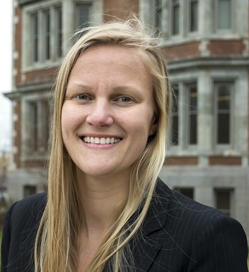
Caitlin Durkee
Thesis Title:
G protein signaling in astrocytes regulates neuronal excitability and synaptic plasticity
Current Position:
Postdoctoral Associate, University of California, San Francisco
Undergraduate Institution and Major:
Georgetown University, B.S. in Biology, 2011
Graduate Advisor:
- Alfonso Araque, Ph.D., Department of Neuroscience
Description of Graduate Research:
The focus of the Araque Lab is to better understand the mechanisms and physiological consequences of astrocyte-neuron signaling in various brain regions. My graduate work in particular investigates the properties and consequences of astrocyte-neuron signaling in the dorsolateral striatum, an area implicated in habit formation, using multiple techniques, including: intracellular and extracellular electrophysiology in both slice preparation and in vivo; optogenetic stimulation; DREADDs application; two-photon microscopy; and behavioral testing.
Graduate Publications:
- Durkee C, Kofuji P, Navarrete M, Araque A. Astrocyte and neuron cooperation in long-term depression. Trends Neurosci. 2021 Jul 30:S0166-2236(21)00126-0.
- Cavaccini A, Durkee C, Kofuji P, Tonini R, Araque A. Astrocyte signaling gates long-term depression at corticostriatal synapses of the direct pathway. J Neurosci. 2020;40(30):5757-5768.
- Durkee CA, Covelo A, Lines J, Kofuji P, Aguilar J, Araque A. Gi/o protein-coupled receptors inhibit neurons but activate astrocytes and stimulate gliotransmission. Glia. 2019;67(6):1076-1093.
- Durkee CA, Araque A. Diversity and specificity of astrocyte-neuron communication. Neuroscience. 2019;396:73-78.
Professional Presentations:
- Gliotransmission. Panel participant at the Winter Conference on Brain Research, Whistler, Canada, January 18th, 2018.
- Gi/o protein-coupled receptors inhibit neurons but excite astrocytes. Oral presentation at Graduate Program in Neuroscience Retreat, IDS Building, Minneapolis, MN, Feb. 11, 2017.
- The role of astrocytes in mediating neuronal activity in the dorsolateral striatum. Poster presentation at Graduate Program in Neuroscience Retreat, Nicollet Island Pavilion, Minneapolis, MN, Feb. 14, 2015.
Graduate Level Awards:
- Council of Graduate Students Travel Grant, 2018
- F31 Ruth L. Kirschstein National Research Service Award, 2015
- Sping and Ying Ngoh Lin Award, 2015
- Stark Award, 2015
Graduate Program in Neuroscience Committees:
- Steering Committee, 2017-present
- Council of Graduate Students, 2014-2015
- Student Board Third Year Representative, 2015-present
Professional Outreach:
- Brain Awareness Week Instructor, 2013-2015
- Social Science, Science Museum of Minnesota, Oct. 2015
Internships:
- University Economic Development volunteer intern, Spring 2016
- University Economic Development Fellow, Summer and Fall 2016
Professional Memberships:
- Society for Neuroscience, 2013-present
Thesis Committee Members:
- Eric Newman, Ph.D., Department of Neuroscience (Chair)
- Alfonso Araque, Ph.D., Department of Neuroscience
- Matt Johnson, Ph.D., Department of Biomedical Engineering
- A. David Redish, Ph.D., Department of Neuroscience
Research Areas:
- Behavior and Cognitive Neuroscience
- Synaptic Plasticity and Learning
Rotations:
- Wensheng Lin, Ph.D., Department of Neuroscience
- Michael Georgieff, M.D., Department of Pediatrics
- Wynne Schiffer, Ph.D., Department of Neurology
- Kathleen Thomas, Ph.D., Institute of Child Development
- Alfonso Araque, Ph.D., Department of Neuroscience
Why Did You Choose MN?
The breadth of the program, the value of collaborative science, and the sense of community drew me to the GPN.
What Advice Would You Give A First Year Graduate Student?
You belong here! Don’t underestimate what you know and your potential to learn.
